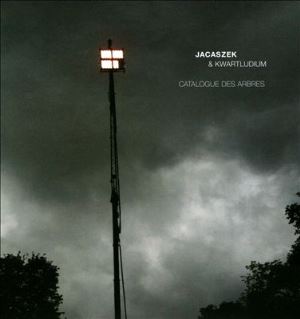Despite it being deserving of reams of text as to its making, you can just enjoy the utter sensuousness of Catalogue des Arbres.
Despite it being deserving of reams of text as to its making, you can just enjoy the utter sensuousness of Catalogue des Arbres.

(Touch)
http://www.jacaszek.com http://www.konkurrent.nl http://www.Kwartludium.com
Sometimes listening to things that sound like everything and nothing is just the best. This record purports to evoke the sounds and feel of the forest; and in doing so uses a whole host of classical and modern techniques. In keeping with a lot of modern classical there is a direct link with the past masters, and here the link to Messiaen’s Catalogue d’Oiseaux can’t be a coincidence. In many ways Catalogue des Arbres has a feel of a work of the late 19th century. In its approach it’s reminiscent of Debussy’s La Mer, the naïve jungle images of Henri Rousseau, or the weird phantasmagorical images of Odlion Redon. It’s also drawing heavily on a deep seated, very Polish love of the forest; especially the Polish relationship with the primeval tracts of forest such as Białowieża, one that has shaped that country’s worldview since the year dot.
But it’s also a great listen on a lot of very accessible levels; at turns incredibly quiet and restful in other passages very, very theatrical and grand, and a record that touches on a whole host of musical conceits to make its point. Despite it being deserving of reams of text as to its making, (as there is a great deal of background and intellectual hinterlands that were explored in this LP’s recording) you can just enjoy the utter sensuousness of Catalogue des Arbres. A Book of Lake or Circling both have a jazzy, post-rock feel that could sit very comfortably on a Miles Davies record. The cracking, sparky and hypnotic Kingdom is really close to Conny Schnitzler’s Divine musings. There’s also a fair bit of the bright, pinpoint aestheticism of the Radiophonic Workshop in here, or the sleaziness of Studio G, for that matter. If we are talking about feel as being the driving motif, then we should mention the buildup on Green Hour, which is marvellous; a slowly creeping piano coda creates a structure for a wider range of crackling and fizzing noises, which are balanced against clarinet and violin. Elsewhere, From a Seashell threatens to explain itself throughout but never does so; preferring to build up an increasingly suffocating aura of suspense. The brilliant chinks of the triangle are wonderful counterpoints to the creepy backlight.
So a great, disturbing, enervating listen, don’t feel intimidated; and in the words of the immortal Brian Clough, get in there!
